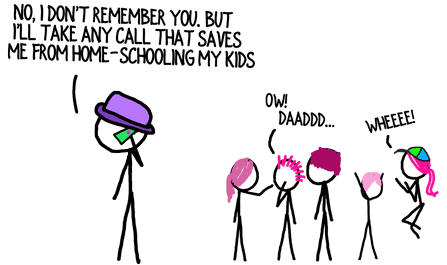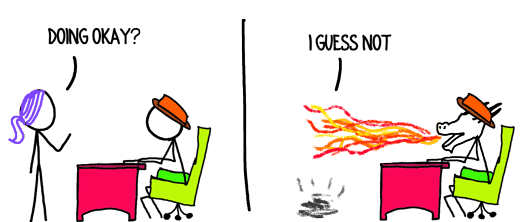What do you do when your well-intended outreach call crashes into a brick wall of negativity?
Like many consulting firm leaders, you may have been burning up the phone lines the past week or two, reaching out to your clients and other contacts. Your motives are pure—admirable even. You’re checking in, showing support during a difficult time and offering help.
By and large, your efforts engender successful conversations. More executives are picking up the phone these days.

Plus, the people you reach appreciate your call and share their recent tribulations and coping strategies with good humor. They know we’re all in the same boat and communal support is a good thing.
When you reach out to Sawyer Hedoff, though, you’re treated to an altogether different response:
You: “How’s it going?”
Sawyer: “Freakin’ awful. That’s how it’s going. Really terrible. Now, why are you bothering me?”
Ouch.
Facing pessimism, misery and outright hostility is tough.
However, you’ll occasionally encounter a client who’s in crisis. If you’re prepared to handle the conversation gracefully, you’ll help a person in need and strengthen your relationship.
Sawyer, for instance, is burdened by a pandemic, a painful misunderstanding (“No, milk chocolate is not okay”) or some other stress-inducing situation.

He’s not alone. Many of your consulting firm’s contacts are scared right now. Afraid for their livelihoods, their families and even their lives.
Fear can chisel off a person’s soft, civil, friendly outer coating, and expose their sharp-edged, self-protective instincts.
Three, easy to remember steps will work wonders when you inadvertently wander into your contact’s angry line of fire.
Stay Right-Side Up
Remember, it’s not about you or your consulting firm, it’s about them. In other words, don’t take their tirade personally.
Respond with Empathy
Focus your reaction on the emotion, not the content.
“Gosh, Sawyer, I’m sorry to hear it’s not going well. You sound super frustrated.”
Resolutely Offer Help
Unapologetically, and unwaveringly extend support, no matter what the contact throws your way.
“I know I’m probably not the first person you’d call, or maybe even the tenth. But I want to let you know that I’m here if you need someone to talk to, vent at or work through a problem with.”
No matter what reaction Sawyer hurls at you in the moment, your warm, human, encouraging touch will be regarded well when his emotional flood recedes.
Are there other approaches you’ve found helpful when dealing with an overwrought, emotional contact? Please share below. Your thoughts will definitely help other readers!
Text and images are © 2024 David A. Fields, all rights reserved.

 David A. Fields Consulting Group
David A. Fields Consulting Group 

it is tough out there these days…no easy fix.
You’re right, Volker, it is tough out there for quite a few people. Exercising your empathy and natural helpfulness will help everyone you (virtually) touch stay strong.
Thank you for voicing your experience, Volker–it makes a difference.
First, just listen. Sometimes people who are in the throes of an upending situation/emotion just need a safe place to vent. Part of your “staying right-side up” in my mind, David, is offering a calm, available presence. Despite the fact that many of us in the helping professions are eager to offer something in the face of a difficult situation, be careful about moving to solutions too soon. Allow for the fact that it’s okay to just be with something difficult — without judgment and with support.
Very well said, Carole. We can hardly be making the conversation about Them if we’re doing all the talking! Listening is the inviolable starting point for staying Right-Side Up.
Plus, as you pointed out, it’s okay to just accept a person and their situation without judgement and without trying to fix it! (That’s a challenge for many “I can fix it!” consultants.)
Great addition to the conversation, Carole.
Any time you reach out to someone, it is possible that you are catching them at a particularly vulnerable or stressful moment. These tips don’t just apply to crisis situations; they are useful at any time. Most important is my own mindset – I have to be mindful that my call or email might catch my client at just the wrong moment and they need to unload and I am the convenient target. The first thing I need to remember to do when I reach someone who is feeling negative is to take a deep breath and not just react. Only when I have stepped back from the initial negative reaction can I remember that this is not about me and I can be right-side up.
That’s absolutely the case, Derek. Staying Right-Side Up in the face of a broadside is surprisingly difficult. It stings to be on the receiving end when someone is lashing out.
Your strategy of taking a deep breath before reacting is a good one. (For me it’s a deep breath and a handful of chocolate covered almonds. The time it takes me to chew them affords an opportunity to reset my mindset.)
Thank you for adding your insights today.
Wait, what if you’re the consultant who actually *can* help you homeschool your kids?!
Yeah, maybe it’s time to switch your offering to a virtual, home-schooling package. I bet you could create a healthy business with that right now!
Thanks for jumping into the conversation, today.
Timely and reassuring…thank you. As a demonstration of empathy, some are offering clients a reduced, short-term rate or even a deferral of their payment. For organizations is financial crisis, this seems to be greatly appreciated. Is anyone considering this with their clients? Would appreciate any insight on either side …wouldn’t want to diminish value but know this is a unique time.
Good question, Ken. I recommend extending very generous terms to alleviate your prospects’ concerns about cashflow, and not reducing your fees. (I’m not really a fan of “rates,” but that’s a separate discussion.)
A deferral of payments would fall under generous terms. (Defer some, not all, payments.)
Thanks for raising the idea for discussion, Ken!